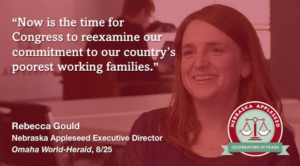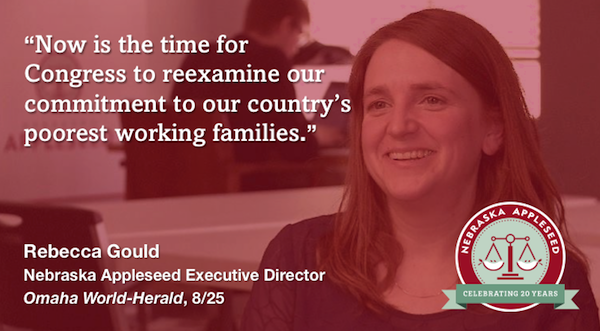Today’s Omaha World-Herald features a column from our Executive Director Becky Gould on the 20th anniversary of a big change Congress made to the way the U.S. fights poverty for our country’s poorest working families with children.
Starting in 1996, the Temporary Assistance to Needy Families (TANF) restructured one of the country’s most important public assistance programs. This anniversary, Becky writes, is a good time to start a long-overdue conversation about how to improve TANF to make sure it’s working the way it’s supposed to work – to help working families navigate the path out of poverty.
If you don’t have a subscription to the World-Herald, you can read the column below:
Let’s improve the path out of poverty
By Rebecca Gould
The author is the Executive Director of Nebraska Appleseed.
When Congress passed sweeping changes to America’s work-support programs in 1996, it marked a large shake-up in the way our country approached its commitment to ensure that our poorest families with children could meet their basic needs while continuing to work to get ahead.
 The changes turned funding for cash assistance for America’s lowest-income families into a block grant known as the Temporary Assistance to Needy Families.
The changes turned funding for cash assistance for America’s lowest-income families into a block grant known as the Temporary Assistance to Needy Families.
Supporters of the program, which funds Nebraska’s Aid to Dependent Children cash assistance program, contended the new structure would give states more flexibility. However, the reality is the federal program has made it harder in many ways to help people find good jobs that support families and build strong communities.
This week marks the program’s 20th anniversary, and it is a good time to take a look at how this change in how our nation fights poverty is working. This funding has provided essential support for thousands of low-income, working families by helping many of them make ends meet.
The relatively small amount of money that Nebraska families receive from the program — a maximum of $436 a month for a family of three — often can make all the difference in making sure parents can keep a roof over their children’s heads and food on the table.
Unfortunately, the program contains some very real flaws that prevent it from helping more families work their way out of poverty.
Instead of encouraging hard-working Nebraskans to develop skills to find a job that pays a family-supporting wage, this program places narrow emphasis on obtaining work of any kind.
In other words, once a participant merely receives a minimum-wage job, the assistance disappears entirely.
The program is structured to be temporary, but escaping poverty isn’t always a quick fix. Earning the minimum wage doesn’t move a family out of poverty. Not with bills, housing costs, food and the expenses of raising children.
The program’s restrictions are not the way work-support programs are intended to help people. We know Nebraska has one of the country’s lowest unemployment rates, but too many parents are still in jobs that don’t pay enough to meet all of their families’ basic needs.
Another drawback is that the funding hasn’t kept up with inflation, so it is helping families considerably less than it used to. In 1996, 68 out of every 100 families in poverty received assistance. In 2014, only 23 out of every 100 families in poverty received the benefits. It now helps less than one in five poor children.
A serious conversation about improving Temporary Assistance to Needy Families is long overdue. It is a critical program that has helped many Americans. But it can be greatly improved from how it’s being currently administered.
Public assistance must provide families with the support they need, not just until they simply have a job, but until they are able to make a livable wage.
Nebraska already is a national leader in letting recipients pursue education as a work activity. This policy should be made the standard nationwide so more people have the chance to obtain an education and job skills training.
We must also end the punitive focus that often results from this funding program. While participants must follow a work plan in order to receive assistance, life often complicates schedules.
If someone has car trouble or must care for a sick child and misses a weekly work requirement by a small margin, the family should not lose all of its public assistance. This only keeps working Nebraskans trapped in the crushing cycle of poverty.
Now is the time for Congress to re-examine our commitment to our country’s poorest working families and improve the most-important pieces of this assistance program. Restoring it to a meaningful work-support program will let hard-working people build a bridge out of poverty, the way it always was intended.

